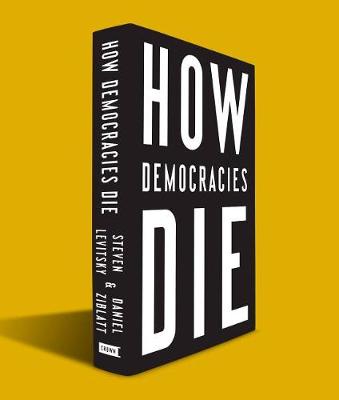
Two Harvard professors explain the dangerous world we face today
Democracies can die with a coup d'etat - or they can die slowly. This happens most deceptively when in piecemeal fashion, with the election of an authoritarian leader, the abuse of governmental power and the complete repression of opposition. All three steps are being taken around the world - not least with the election of Donald Trump - and we must all understand how we can stop them.
In How Democracies Die, Harvard professors Steven Levitsky and Daniel Ziblatt draw insightful lessons from across history - from the rule of General Augusto Pinochet in Chile to the quiet undermining of Turkey's constitutional system by President Recip Erdogan - to shine a light on regime breakdown across the twentieth and twenty-first centuries. Notably they point to the dangers of an authoritarian leader faced with a major crisis.
Based on years of research, they present a deep understanding of how and why democracies die; an alarming analysis of how democracy is being subverted today in the US and beyond; and a guide for maintaining and repairing a threatened democracy, for governments, political parties and individuals.
History doesn't repeat itself. But we can protect our democracy by learning its lessons, before it's too late.
- ISBN10 1524762938
- ISBN13 9781524762933
- Publish Date 16 January 2018
- Publish Status Out of Stock
- Imprint Crown Publishing Group (NY)
- Format Hardcover
- Pages 320
- Language English
Reviews


Joséphine
Initial thoughts: I remember my 9th grade history teacher telling us that we take democracy for granted. It assumes that the majority is right, which isn't always true. In other words, he taught us that democracy is the tyranny of the majority.
In many regards, democracy does ensure that a nation flourishes. However, when those in political power disregard that laws and mores, that's when the ways are paved towards authoritarianism. How Democracies Die is a cautionary book about the future of the US, if the US doesn't learn from the histories of countries around the world where democracies died, as well as of countries where the checks and balances ensured that autocrats did not manage to establish themselves.
As a non-American, I found How Democracies Die quite enlightening because I never quite understood the American political system. Yes, I knew that the dominant political parties are the Republicans and Democrats. I learnt about the Cold War and the US-Soviet relations, the Vietnam War and also briefly about the American occupation of the Philippines after the US won the war against Spain in 1898. These, however, all pertained to American international relations. As for internal politics, I've always read the news with bemusement.
Thanks to this book, I've come to better understand the deep political divisions that's driven by identity politics as well. For instance, it didn't occur to me to unfriend anyone on Facebook just because they held different political views to mine. Yet, I kept reading about Americans doing this over the past few years. I still think it's myopic but I can also better empathise how taking politics so personally would affect relationships.
And while gerrymandering isn't uncommon in East and Southeast diviAsia, I was surprised to learn how such practices were used for racist gains in the US before, to ensure that black men wouldn't be able to vote at all, even though slavery had ended. It's sad and maddening, but also makes me glad for the progress that's been made since then. I sincerely hope that this progress will not be undone in the country touted as the Free World.
